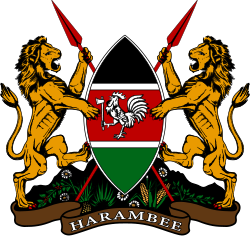| # | Name
(birth–death) | Took office | Left office | Notes |
|---|
|
| Commissioners and Governors of the East Africa Protectorate |
| 7 | SirArthur Henry Hardinge
(1859–1933) | 1 Jul 1895 | 7 Oct 1900 | |
| 8 | Trevor Ternan | 7 Oct 1900 | 30 Dec 1900 | |
| 9 | SirCharles Eliot
(1861–1931) | 30 Dec 1900 | 20 May 1904 | |
| 10 | Frederick John Jackson
(1860–1929) | 20 May 1904 | 1 Aug 1904 | |
| 11 | SirDonald William Stewart
(1860–1905) | 1 Aug 1904 | 1 Oct 1905 | |
| 10 | Frederick John Jackson
(1860–1929) | 1 Oct 1905 | 12 Dec 1905 | |
| 12 | SirJames Hayes Sadler
(1827–1910) | 12 Dec 1905 | 12 Apr 1909 | |
| 13 | Sir Charles Calvert Bowring
(1872–1945) | 12 Apr 1909 | 16 Sep 1909 | |
| 14 | SirPercy Girouard
(1867–1932) | 16 Sep 1909 | 17 Jul 1912 | |
| 13 | Sir Charles Calvert Bowring
(1872–1945) | 17 Jul 1912 | 3 Oct 1912 | |
| 15 | SirHenry Conway Belfield
(1855–1923) | 3 Oct 1912 | 14 Apr 1917 | |
| 13 | Sir Charles Calvert Bowring
(1872–1945) | 14 Apr 1917 | 1 Feb 1919 | |
| 16 | SirEdward Northey
(1868–1953) | 1 Feb 1919 | 11 Jun 1920 | |
|
| Governors of The Colony and Protectorate of Kenya |
|
| 16 | SirEdward Northey
(1868–1953) | 11 Jun 1920 | 28 Aug 1922 | - East Africa Protectorate renamed The Colony and Protectorate of Kenya.
- 10 mile coastal strip under the domain of the Sultan of Zanzibar becomes a Protectorate.
- Founding of Reform Party
|
| 17 | SirRobert Coryndon
(1870–1925) | 31 Aug 1922 | 10 Feb 1925 | |
| 18 | Edward Brandis Denham
(1876–1938) | 10 Feb 1925 | 3 Oct 1925 | |
| 19 | Edward Grigg
(1879–1955) | 3 Oct 1925 | 27 Sep 1930 | - Native Lands Trust Ordinance
- Rudolf Province ceded from Uganda
- Coryndon Museum opened
- Health care established for all races (by Joan Grigg) [1]
|
| 20 | SirHenry Monck-Mason Moore
(1887–1964) | 27 Sep 1930 | 13 Feb 1931 | |
| 21 | SirJoseph Byrne
(1874–1942) | 13 Feb 1931 | 22 Dec 1936 | |
| 22 | SirArmigel Wade
(1880–1966) | 22 Dec 1936 | 6 Apr 1937 | |
| 23 | SirRobert Brooke-Popham
(1878–1953) | 6 Apr 1937 | 9 Jan 1940 | |
| 24 | Walter Harragin
(1890–1966) | 30 Sep 1939 | 9 Jan 1940 | |
| 20 | SirHenry Monck-Mason Moore
(1887–1964) | 9 Jan 1940 | 25 Oct 1944 | |
| 25 | SirPhilip Mitchell
(1890–1964) | 11 Dec 1944 | 21 Jun 1952 | |
| 26 | Henry Steven Potter
(1904–1976) | 21 Jun 1952 | 29 Sept 1952 | |
| 27 | SirEvelyn Baring
(1903–1973) | 30 Sept 1952 | 4 Oct 1959 | |
| 28 | Walter Coutts
(1912–1988) | 4 Oct 1959 | 23 Oct 1959 | |
| 29 | SirPatrick Muir Renison
(1911–1965) | 23 Oct 1959 | 17 Nov 1962 | |
| 30 | Sir Eric Griffith-Jones
(1913–1979) | 17 Nov 1962 | 4 Jan 1963 | |
| 31 | Malcolm MacDonald
(1901–1981) | 4 Jan 1963 | 12 Dec 1964 | |
|

